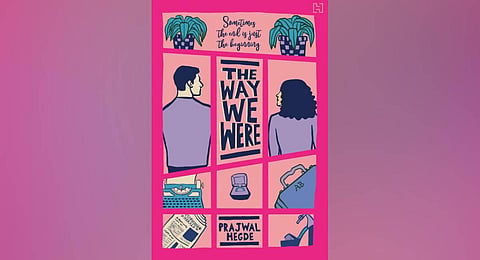

In Prajwal Hegde’s The Way We Were, two people in love, torn apart by time and circumstances, find their way back to each other. The quintessential feel-good 21st-century romantic comedy does not have much novelty to offer thematically. But Hegde’s innovative use of the oft-used premise, which she embellishes with a fast-paced narrative, delivers an unputdownable read.
One-half of the protagonist couple is Andrew Brown. The Anglo-Indian political activist has returned to his old stomping grounds in Bengaluru as the editor of a fictional newspaper, The Morning Herald. But that is not all that’s on his mind. There’s also the agenda of reconnecting with his old flame, Myra, the feisty journalist, whom he abandoned before moving to the US, and who is now set to tie the knot with the scion of a political family.
Hegde’s writing shines in the details. The primary setting of the novel is The Morning Herald office, and the author, being a journalist herself, manages to recreate the newsroom to a T.
Sample this:
“I had come in early to finish my story and start work on the pages. That means going to war for advertisement positions, which, most of the time, is extreme, one way or the other... editorial-ad department face-offs are as old as the caste system and as new as brand battles.” Scribes reading the book are likely to be impressed with the accuracy, and for others, it serves as a fascinating peek into the day-to-day workings of the media industry.
Considering the tension between Andrew and Myra, the foundation for which is laid early on in the novel, the narrative is expectedly peppered with intense episodes of lovemaking. Hegde etches out the intricacies with equal finesse, like she does with the idea of loss. The latter is evoked in a heart-rending episode when Myra loses her mother in a freak accident. Hegde weaves in Myra’s initial denial, and eventual acceptance, of the grief with a tenderness that does not disturb the pace of the main plot-line.
The author rarely takes any risk with the largely predictable story. One noteworthy gamble though is her approach towards friendship. At a time, when novel after novel is harping over the strength of female friendships, Hegde puts Myraa and her best friend, Meena, at loggerheads, but sans the mysoginistic gaze, which has pitted women against each other for ages. The narrative mourns the falling apart of the two friends with endearing sensitivity and pathos.
A breezy read, The Way We Were’s success lies in its self-awareness. It is a romantic comedy, and does not pretend to be anything more. Combining the best clichés of the genre—a brooding hero, a headstrong female lead, circumstances, including an unassuming villain, driving a wedge between them—it almost reads like a script for a masala Bollywood film, and that may not always be a bad thing.
The Way We Were
By: Prajwal Hegde
Publisher: Hachette
Pages: 304
Price: Rs 499